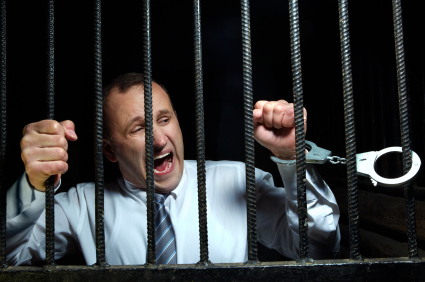Let’s pretend that I am a felon.
Maybe I had too many DUIs, didn’t pay child support, wore white after Labor Day, or smoked a cigarette within four hundred yards of another carbon-based life form. I can’t vote. I can’t own a gun. I might be a nice guy who owns a home, and pays my taxes, just like you. But I’ve made a mistake or two. Hopefully, I regret it.
But I also probably have the type of sketchy work history typically bestowed on members of this club. Certain doors closed to me when I became a felon. Particularly jobs dealing with money, or with children. Or children with money. Once I punched my F-Card, I made sure that prospective employers would be forever wary of trusting me. Is that right?
*****
The traditional difference between a felony and a misdemeanor was the punishment, not the act itself. Any crime which could be punished by a year or less in jail was a misdemeanor. Crimes where punishment was possibly more than 1 year in jail were felonies. Misdemeanors were handled locally – in county jails. Felonies required state institutions. This oversimplification is not totally accurate, but it’s useful. Over time, the word misdemeanor developed a less severe–almost flippant–tone, while felony grew to be synonymous with “serious crime.”
The albatross of felonious convictions in the search for employment is not new, but push-back against “felons need not apply” hiring rules is growing. The latest victim? The NCAA. In a federal court in San Diego, a lawsuit claims the NCAA’s rule which prohibits felons from coaching NCAA events violates the Civil Rights Act. Well of course it does. Surely felons have the right to coach the college team of their choosing. I’m certain I read that in the Constitution somewhere. I think it’s the 4th Amendment’s prohibition against unreasonable searches and seizures of Lacrosse Team assistants. Or maybe it’s within the penumbras and emanations of third base coaching.
As Walter Olson recently noted, this fits the Equal Employment Opportunity Commission’s “crackdown” on employer consideration of criminal records. The rock and the hard place are becoming clear. On one hand, the myriad risks that come with hiring a felon, and on the other hand, the EEOC’s new minefield that comes with wrongfully using a criminal record to deny employment. The space between is shrinking.
Reality is not complicated. Of course felons are discriminated against in employment. So what? Also victims of discrimination: the unskilled, the dim-witted, the unqualified, the unhygienic, and the chronically tardy. Businesses don’t want to hire these people any more than I want to pay for goods or services from businesses who do. Not all discrimination is illogical, let alone immoral or illegal.

Choices have consequences. Adults deal with those consequences. Children do not. It’s ironic to see felons–often those for whom violence was a calling card and an identity trait–reduced to the position of sniveling toddlers, their litigious little eyes welling up over the loss of phantom civil rights violations. If you don’t believe me, Google “prisoner lawsuit” and dig in. You’ll find great tales about some brutal wife-beater who boo-hoos that he didn’t get vegan lasagna during his time in cell block C. Or a child molester whose first amendment rights are in peril because he finds the prison library’s Judy Blume collection a tad wanting.
Not every felon is a violent slug, devoid of a compelling reason to share oxygen with the rest of us – I get that. It’s been far too easy for the feds to create felonies where none existed twenty years ago. Every time a politician wants to show that he’s tough on crime, he proposes relocating some crime from Misdemeanorland to Felonyville, which makes for press releases like:
Sen. Jones, fighting tirelessly for Hoosier families and Hoosier veterans and Hoosier elderly and Hoosier kids, wants to make it a felony for fast food restaurants to serve you breaded chicken when you very clearly ordered grilled and you even, like, had her read it back to you to be sure. Because Sen. Jones thinks that’s just wrong. And he’s fighting for you. Did we mention the kids?
Maybe it’s not that silly. Yet. But it’s not just lawmakers who fall into this practice. Ask the average person if we punish drunk drivers enough and you’ll likely get a head-shake with a quick “No.” But ask them what the average punishment for drunk driving actually is and you’ll get a blank stare. That’s preposterous. It’s also lazy. None of us want to be considered soft on crime. Not the parent, not the lawmaker, not the judge in his bathrobe ambushed by The O’Reilly Factor, and not employers. But felony short-hand as a substitute for determining a person’s character creates felons out of people who probably should only be . . . jerks. Or misdemeanants, to be precise.
So, as a firm believer in the power of moderation, I offer some advice to both sides of the equation:
Employers – Please stop believing that you have lost control over your own hiring decisions. Guidelines are fine, but hard and fast rules may cause you to miss hiring great employees. You don’t have to go out of your way to hire felons. But unless you are planning to hire for a position where felons are prohibited, or you’re in a business where it just won’t work, don’t paint them all with the same brush. Even if you’re not swayed by the “There but for the Grace of God go I” reflective pause, consider a more mercenary point–as with any business decision, you may miss an opportunity that your competitor won’t.
Felons – Put on your big boy pants and learn how to work construction or a road crew. You’ve earned it, bro. Stop asking society’s standards to change and start meeting them yourself.